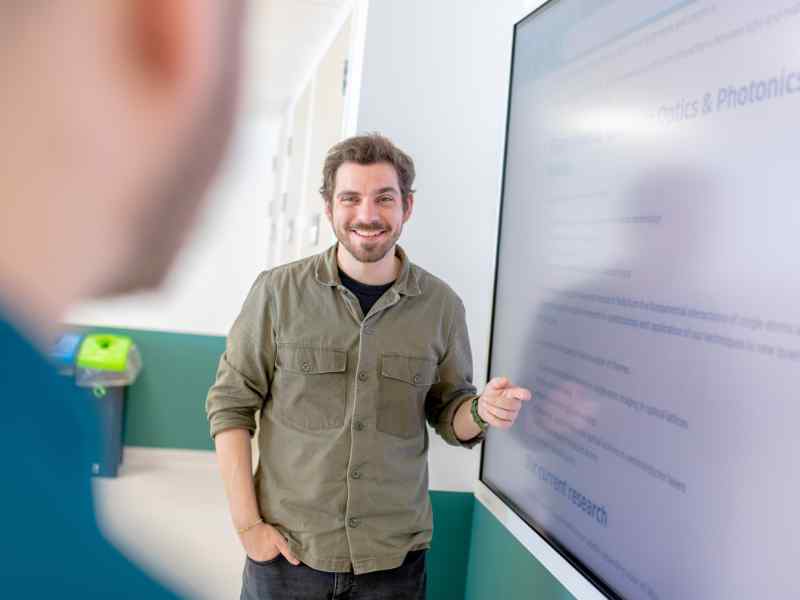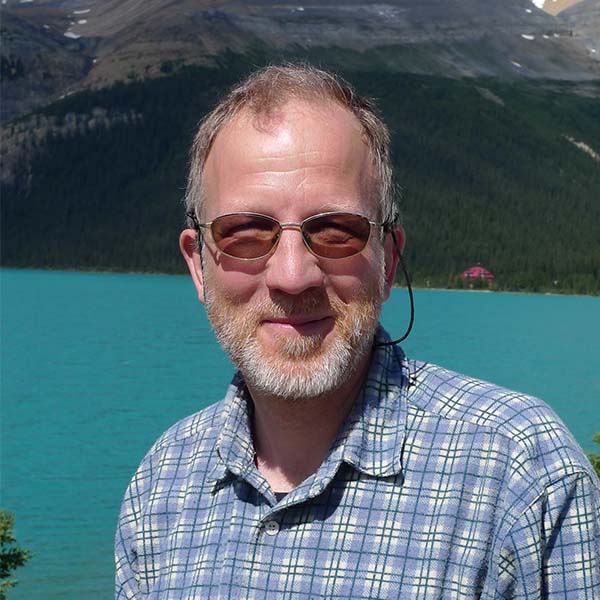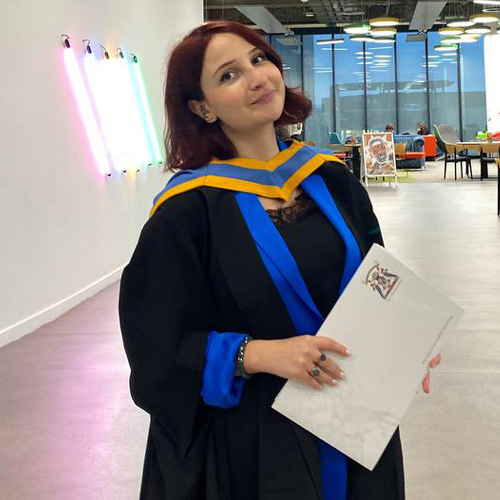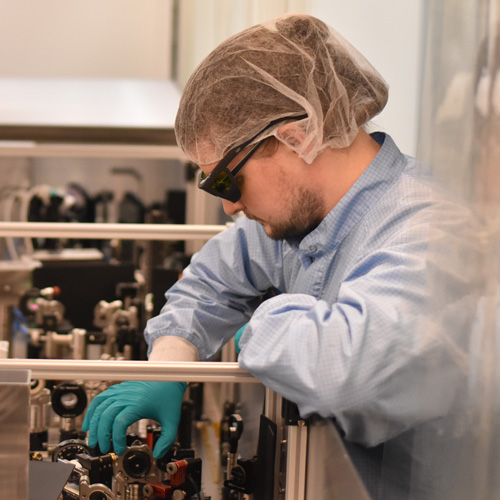MSc/PgDip Photonics
ApplyKey facts
- Start date: September
- Study mode and duration: MSc:12 months full-time, 24 months part-time
PgDip: 9 months full-time, 21 months part-time Ranked: Top 5 in the UK for Physics by the Daily Mail University Guide Subject Tables 2026
Part-time study: available
Study with us
- gain hands-on experimental research experience using modern instrumentation
- suitable for those with science or engineering background wanting to gain a vocational degree
- establish a foundation for an optics-related PhD
- explores the versatile field of optical technologies which supports many aspects of modern society
- optical technologies are expected to be a key enabling technology of the 21st century
The Place of Useful Learning
UK University of the Year
Daily Mail University of the Year Awards 2026
Scottish University of the Year
The Sunday Times' Good University Guide 2026
Why this course?
The term “Photonics” stresses that the particle aspects of light are crucial in the generation, manipulation, transmission and detection of light and its applications. The course provides the opportunity to explore and master a large range of photonic technologies, enabling you to put devices in the context of an optical system and/or application. The course is based on the strong record of photonic technologies across research divisions in the Department of Physics in collaboration with:
- Optics Division (Physics)
- Plasma Division (Physics)
- Nanoscience Division (Physics)
- Institute of Photonics
- Department of Electronic & Electrical Engineering
You’ll put the knowledge gained in the taught components to use in a cutting-edge research project.


What you’ll study
The course consists of two semesters of taught classes followed by a three-month research project (MSc students only).
You can choose classes relevant to your career interests from a wide range of topics including:
- photonics and photonic materials
- nanosciences
- optics at the physics-life sciences interface
- laser-based plasma physics
- quantum optics and quantum information technology
Learning & teaching
Our teaching is based on lectures, tutorials, workshops, laboratory experiments, and research projects.
Assessment
The assessment of most taught modules is based on a written examination and continuous coursework (about 20%), and, in some modules, an oral examination. The final project is assessed mainly by a report supplemented by a talk, an oral examination (viva) and an assessment of the performance and engagement during the project by the supervisor.
Student competitions
The Department of Physics MSc Excellence Prize
This will be awarded to a meritorious student of at least distinction level on any MSc course offered by the Department. It will be awarded to the student who achieves the highest credit weighted average over the whole course portfolio.
The Department of Physics MSc Prize
This will be awarded to a meritorious student of at least distinction level on any MSc course offered by the Department. It will be awarded to the student who achieves the highest mark for the MSc Project.
Facilities
The course is run by the Department of Physics. We recently invested £4 million in new quantum technology laboratories and a complete refurbishment of the teaching laboratories. Funding of £150,000 was secured from the Quantum Hubs for new state-of-the-art advanced experimental kits for training and demonstration experiments, in particular in the quantum science, photonics and nanoscience areas. Furthermore, Strathclyde recently invested £15 million in refurbishing our John Anderson building (home of the Department of Physics) in order to enhance environmental sustainability and reduce our carbon footprint.
Departmental facilities include:
- well-equipped optical labs for semiconductor photonics, semiconductor spectroscopy and fluorescence lifetime analysis.
- the Ultrafast Chemical Physics lab with state-of-the-art femtosecond laser systems for multi-dimensional IR spectroscopy
- cutting edge high power laser research with SCAPA, the highest power laser in a UK university
- a scanning electron microscopy suite for analysis of hard and soft matter
- access to top-of-the-range high-performance computer facilities
- industry standard cleanroom in the Institute of Photonics
Accreditation
The programme is accredited by the Institute of Physics (IOP) as the professional body for physics in the UK and Ireland.

It’s wonderful to help young people to acquire skills and independent judgment. We enjoy witnessing their development as they become ‘Masters’ in Photonics’.
Course content
Please note: not all optional modules listed are guaranteed to run each academic year, and timetabling constraints may limit availability for some students.
Semester 1
Topics in Photonics: Laser & Nonlinear Optics (20 credits)
You'll study laser physics, laser optics and nonlinear optics as required for the work in many photonic labs.
Semester 1 & 2
Physics Skills (20 credits)
You'll gain necessary skills in IT, working with literature, data analysis, and written and oral communication to support a great learning experience in your programme.
Semester 2
Advanced Photonics Devices (20 credits)
You'll study advanced photonics devices including their principles and applications (quantum confinement, waveguide optics, photonic and electronic bandgaps, photonic crystals).
Summer
Project (60 credits)
You'll gain experience of research techniques by performing an open-ended cutting-edge research project that runs over summer after the taught component of the MSc. The topic may be from a programme relevant field in physics or its interdisciplinary applications. Students with the corresponding ambition and relevant qualification will be supported to find an alternative placement in chemistry or an industrial placement but this depends on availability. The work is normally carried out in the research laboratories under the individual supervision of an experienced researcher.
- In Semester 1 you are required to take one optional module
- In Semester 2 you are required to take two optional modules
Semester 1
Research Skills (20 credits)
You'll gain core skills needed to obtain research funding and successfully manage the resulting research in both an academic and a commercial environment.
Introductory Nanoscience (20 credits)
You'll learn basic concepts relating to nanoscale physics and techniques associated with production and characterisation of nanomaterials/nanostructures, as well as their potential impact in engineering, energy and healthcare.
Photonics Materials & Devices (topics in solid state physics) (20 credits)
You'll study semiconductor physics, semiconductor electronics and semiconductor photonics with an outlook on micro and nano-structures and current hot topics.
Semester 1 & 2
Optical Communication (Photonic Systems) (20 credits)
You'll gain a basic conceptual understanding and working knowledge of fibre optic communications systems and their component parts addressing basic principles, engineering, design and performance limits.
Semester 2
Advanced Topics in Photonics: Ultrafast Physics & Plasmas (20 credits)
You'll study laser-plasma interaction, in particular with very high power and ultrashort pulses, and the resulting applications in radiation sources from the terahertz to the X-ray region, laser fusion and laser-based particle acceleration.
Experimental Laboratories (20 credits)
You'll carry out open-ended practical work in the laboratory conveying the basic skills of instrument handling, data management, record keeping, and develop report-writing and oral presentation skills. You will get training in using Python for data analysis and undertake advanced experiments relevant to your interests.
Advanced Nanoscience 1: Imaging & Microscopy (20 credits)
You'll study spectroscopy, imaging and microscopy techniques associated with modern nanoscience such as:
- fluorescence methods
- single molecule imaging and microscopic techniques
- atomic force microscopy (AFM)
- electron microscopy
Advanced Nanoscience 2: Solid State Nanoscience (20 credits)
You'll learn about defects in semiconductors and their properties, characterization properties and the impact of defects on device performance. You will learn about quantum dots, excitons, and their inclusion in microcavities, magneto-optical properties of semiconductors and spectroscopic and other techniques for characterization. Finally, the module covers example for semiconductor qubits, single-photon spectroscopy, coherent control techniques and macroscopic quantum states based on exciton-polaritons.
Advanced Topics in Light-Matter Interaction and Quantum Optics (20 credits)
You'll study modern developments in the field of quantum optics and light-matter interactions:
- interaction of light with two-level systems (Bloch equations, Mollow spectra) and three-level systems (electromagnetically induced transparency, sub-natural linewidth)
- complex susceptibility and the quantum origin of optical nonlinearities
- quantum interference effects electromagnetically induced transparency
- nonlinear Schroedinger equation and solitons
- open quantum systems and quantum optics in cavities
- collective atom-light interactions
Science at Strathclyde
Take a tour of one of our physics quantum research labs on YouTube and get a flavour of what it’s like to study with us.

Whether the problem is academic or social, it is very reassuring to know that there are people who will support you.
MSc Photonics
Entry requirements
| Academic requirements | Minimum second-class Honours degree, or international equivalent, in physics or a related subject, eg Engineering Physics, Electrical and Electronics Engineering, Chemistry, Biology, Ophthalmology, Material Science, Astronomy. Applicants from an engineering or life science discipline need to have had sufficient exposure to quantum mechanics and solid state physics, eg by semi-conductor technology courses, or need to demonstrate that they can acquire the necessary background. Contact us about your application and the possibility of conversion courses |
|---|---|
| English language requirements | You must have an English language minimum score of IELTS 6.0 (with no component below 5.5). We offer comprehensive English language courses for students whose IELTS scores are below 6.0. Please see ELTD for full details. As a university, we now accept many more English language tests in addition to IELTS for overseas applicants, for example, TOEFL and PTE Cambridge. View the full list of accepted English language tests here. |
Chat to a student ambassador
Want to know more about what it’s like to be a Science student at the University of Strathclyde? A selection of our current students are here to help!
Our Unibuddy ambassadors can answer all your questions about courses and studying at Strathclyde and offer insight into their experiences of life in Glasgow and Scotland.
Pre-Masters preparation course
The Pre-Masters Programme is a preparation course held at the University of Strathclyde International Study Centre, for international students (non-UK/Ireland) who do not meet the academic entry requirements for a Masters degree at University of Strathclyde.
Upon successful completion, you'll be able to progress to this degree course at the University of Strathclyde.
Fees & funding
All fees quoted are for full-time courses and per academic year unless stated otherwise.
Fees may be subject to updates to maintain accuracy. Tuition fees will be notified in your offer letter.
All fees are in £ sterling, unless otherwise stated, and may be subject to revision.
Annual revision of fees
Students on programmes of study of more than one year (or studying standalone modules) should be aware that the majority of fees will increase annually.
The University will take a range of factors into account, including, but not limited to, UK inflation, changes in delivery costs and changes in Scottish and/or UK Government funding. Changes in fees will be published on the University website in October each year for the following year of study and any annual increase will be capped at a maximum of 10% per year. This cap will apply to fees from 2026/27 onwards, which will not increase by more than 10% from the previous year for continuing students.
| Scotland | £12,550 |
|---|---|
| England, Wales & Northern Ireland | £12,550 |
| Republic of Ireland |
If you are an Irish citizen and have been ordinary resident in the Republic of Ireland for the three years prior to the relevant date, and will be coming to Scotland for Educational purposes only, you will meet the criteria of England, Wales & Northern Ireland fee status. For more information and advice on tuition fee status, you can visit the UKCISA - International student advice and guidance - Scotland: fee status webpage. Find out more about the University of Strathclyde's fee assessments process. |
| International | £30,300 |
| Available scholarships | Take a look at our scholarships search for funding opportunities. |
| Additional costs | If you are an international student, you may have associated visa and immigration costs. Please see student visa guidance for more information. All recommended textbooks are available in the library (and some freely available as online resources). However you may wish to purchase your own copies. There are computers in the library and teaching labs but having access to your own laptop will be beneficial. |
Please note: the fees shown are annual and may be subject to an increase each year. Find out more about fees.

Strathclyde exceeded my expectations in so many ways. The supportive professors, comprehensive curriculum, and vibrant campus community have made my time here incredibly rewarding.
MSc Photonics
How can I fund my course?
Scottish postgraduate students
Scottish postgraduate students may be able to apply for support from the Student Awards Agency Scotland (SAAS). The support is in the form of a tuition fee loan and for eligible students, a living cost loan. Find out more about the support and how to apply.
Don’t forget to check our scholarship search for more help with fees and funding.
Students coming from England
Students ordinarily resident in England may be to apply for postgraduate support from Student Finance England. The support is a loan of up to £10,280 which can be used for both tuition fees and living costs. Find out more about the support and how to apply.
Don’t forget to check our scholarship search for more help with fees and funding.
Students coming from Northern Ireland
Postgraduate students who are ordinarily resident in Northern Ireland may be able to apply for support from Student Finance Northern Ireland. The support is a tuition fee loan of up to £5,500. Find out more about the support and how to apply.
Don’t forget to check our scholarship search for more help with fees and funding.
Students coming from Wales
Students ordinarily resident in Wales may be to apply for postgraduate support from Student Finance Wales. The support is a loan of up to £10,280 which can be used for both tuition fees and living costs. Find out more about the support and how to apply.
Don’t forget to check our scholarship search for more help with fees and funding.
International students
We've a large range of scholarships available to help you fund your studies. Check our scholarship search for more help with fees and funding.
International students
We've a thriving international community with students coming here to study from over 140 countries across the world. Find out all you need to know about studying in Glasgow at Strathclyde and hear from students about their experiences.

Embedded within the Institute of Photonics, our team conducts cutting-edge, use-inspired research at the intersection of nanotechnology and biochemistry. We design and study miniature photonic structures built from nanoscale materials, pioneering innovations in microscopic lasers and artificial optical materials. Our work drives advancements in medical diagnostics, quantum and wearable technologies, optical communications, and sustainable solutions.
-Dr Nicolas Laurand, Team Leader Colloidal NanoPhotonics
Careers
The course gives you a thorough basis for a successful job in the photonics, optical and life sciences industries. It provides the basis to excel in more interesting and challenging posts.
The course can also be an entry route into an optics-related PhD programme.
Over the years, many of Strathclyde’s optics and photonics graduates have found successful employment as optical engineers and scientists at the large variety of local laser and optics companies as well as with national and international corporations and research facilities.

You probably won’t get another chance in life where you’re in a position with such easy access to so many experts who are willing to help you – take advantage of that!
MSc Photonics alumnus
Apply
Part time study and Pg Diploma options are available. Please contact science-masters@strath.ac.uk for more information.
Start date: Sep 2026
Photonics
Contact us
Glasgow is Scotland's biggest & most cosmopolitan city
Our campus is based right in the very heart of Glasgow. We're in the city centre, next to the Merchant City, both of which are great locations for sightseeing, shopping and socialising alongside your studies.
Have you considered?
We've a range of postgraduate taught and Masters courses similar to this one which may also be of interest.

